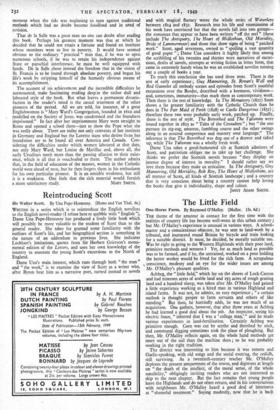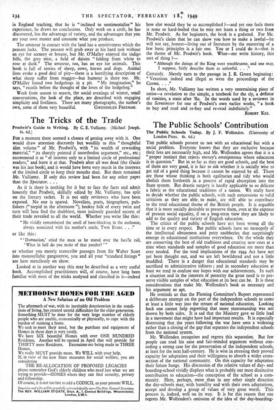The Little Field
One-Horse Farm. By Raymond O'Malley. (Muller. 12s. 6d.)
THE theme of the amateur in contact for the first time with the realities of country life has become well-worn in this urban century ; but Mr. O'Malley's experience is unusual in various ways. A school- master and a conscientious objector, he was sent to land-work by a tribunal, and journeyed round Britain by bicycle and train looking for a suitable district. It must, he decided, be morally suitable too. Was he right in going to the Western Highlands with their poor land, primitive methods and wetness ? Yet, for as much land as possible was to be farmed, and if he, the untrained, worked on a poor holding the better worker would be freed for the rich farm. A scrupulous conscience, modesty and an eye for the wider issues are among Mr. O'Malley's pleasant qualities.
Achbeg, the " little field," which lay on the shores of Loch Carron and had nineteen acres of arable land and 193 acres of rough grazing land and a hundred sheep, was taken after Mr. O'Malley had gained a little experience working as a hired man in various Highland and island farms. It was not, he admits, an easy experience ; " a certain outlook is thought proper to farm servants and others of like standing." But then, he hurriedly adds, he was not much of an acquisition. One gathers, however, that after three years at Achbeg he had learned a good deal about the job. An inspector, seeing his electric fence, " inferred that I was a ' college man,' " and he made various experiments in land-fertilisation. Certainly Achbeg was primitive enough. Corn was cut by scythe and threshed by stick, and communal digging sometimes took the place of ploughing. But then, Mr. O'Malley reflects again, on the whole hand methods get more out of the soil than the machine does ; so he was probably working in the right tradition.
The district was interesting to him because it was remote and Gaelic-speaking, with old songs and the social evening, the ceilidh, still surviving. As a twentieth-century teacher Mr. O'Malley deplores the present amusements of the towns, and digresses at length on " the death of the intellect, of the moral sense, of the whole sensibility," obligingly inviting readers who are not interested to skip to the next chapter. But the fact remains that young people leave the Highlands and do not often return, and in his conversations with neighbours Mr. O'Malley heard a good deal of bitterness at " shameful treatment." Saying modestly, now that he is back
in England teaching, that he is "inclined to sentimentalise" his experience, he draws no conclusions. Only work on a croft,-he has discovered, has the advantage of variety,.and the advantages that you are your own master and consume what you produce.
The amateur in contact with the land has a sensitiveness which the peasant lacks. The peasant will grub away at his hard task without an eye for scenery or botany, but Mr. O'Malley enjoyed the indigo hills, the grey mist, a field of daisies " folding from white to rose at dusk." The amateur, too, has an eye for animals. This book is full of stories of sheep, rows, horses and dogs. Animal lives evoke a good deal of pity—there is a horrifying description of what sheep suffer from maggot—but humour is there too. Mr. O'Malley found two hedgehogs in a pit. " My imagination," he says, " recoils before the thought of the loves of the hedgehog."
Work from season to season, the social evenings of winter, small conversations, the look of the place, are described with engaging simplicity and liveliness. There are many photographs, the author's
own, some of them very beautiful. GWENDOLEN FREEMAN.







































 Previous page
Previous page